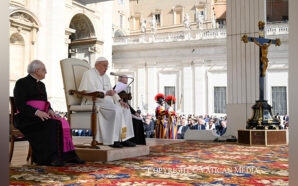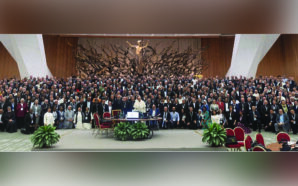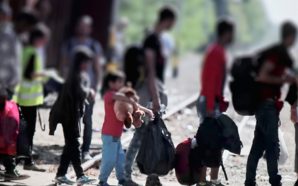On 24 September, the Canadian Conference of Catholic Bishops issued a formal apology to indigenous peoples for the Church’s role in staffing residential schools.
Canada’s Bishops, meeting in their Autumn Plenary Assembly, unanimously approved a statement which recognized that “grave abuses” had been committed by some in the Catholic community, and expressed their “profound remorse” and apologized “unequivocally.”
RELATED: Canadian Bishops apologize for ‘grave abuses’ at residential schools
Ahead of the Canadian commemoration of the first National Day for Truth and Reconciliation on 30 September, Archbishop Donald Bolen, Archbishop of Regina, Saskatchewan, recorded this video message.
Reflections on Walking Together on the Journey to Right Relationships:
A Message from Archbishop Donald Bolen
Archbishop of Regina, Saskatchewan, Canada
Over the past week, the Catholic bishops of Canada have sought to take some steps on the long journey towards right relationships with the Indigenous Peoples of this land. While many previous apologies had been offered, they hadn’t been presented collectively on behalf of all the Catholic Bishops of Canada, and for many survivors of residential schools, they weren’t seen as all that helpful. Friday’s unequivocal apology was accompanied by a renewed commitment to assist with documentation as able, and to work with the Holy See and Indigenous partners on a possible visit of Pope Francis to Canada. Yesterday, a further communication of a nation-wide collective financial commitment of 30 million dollars over 5 years was announced, to support healing and reconciliation initiatives for residential school survivors, their families, and their communities.
The Truth and Reconciliation Final Report, and many Indigenous people, have noted that apologies are a starting point, not an end point, and that they need to be followed by real commitment. When a relationship is wounded and we seek to make right a relationship that has gone wrong, it takes time, and many steps. Failures need to be acknowledged; apologies made; a deep listening to those who have been hurt; a willingness to change, to make amends; and finally, to walk with the other in solidarity on the path of seeking justice on a societal level, to be an ally in the pursuit of right relationships. It should not surprise nor hurt those in the church when we hear Indigenous people and others say ‘seeing is believing.’ I learnt a saying a while ago: if you want to know if an apology is real, watch the feet. We know and appreciate that people will be watching our feet to see whether we are able to meet the commitments we make.
Here in the Archdiocese of Regina, we look forward to continuing and building upon the work we have already begun in our diocese in seeking to foster relationships of healing, listening, and education with the First Nations and Métis Peoples, and especially with survivors. I reiterate our commitment to take steps in close consultation with Indigenous Elders and with survivors of the residential school system. We have heard and resonate with the message, “nothing about us without us.”
Since announcing on a provincial level a Catholic Truth and Reconciliation Healing campaign in July, there have been several opportunities to meet with survivors and Elders, to listen to their needs and hopes, and to ask what solidarity and support would look like from their perspective. We have heard a strong request for financial support of initiatives which respond directly to the needs of survivors and which prioritize their concerns and needs. We heard of the desire to build relationships and to draw on the assistance of Indigenous spiritual leaders in facilitating a way forward with the various First Nations communities within the boundaries of the Archdiocese. We heard of the need for an initiative in the city of Regina which would be guided by survivors and present practical steps which would bring healing for survivors and assistance with intergenerational trauma experienced by many as a result of the residential school system. We heard a request to assist in work related to the cemeteries of the Catholic-operated residential schools within our region. And we heard the importance of educating and engaging the people of our Catholic parishes, especially those who are near to First Nations communities, so that they too can play a role in the rebuilding of relationships and become allies in the pursuit of a better, more respectful and more just way to live together.
We were also encouraged to draw on Call to Action 61 as a roadmap going forward, with its call for support of community-controlled healing and reconciliation projects; culture and language revitalization initiatives; education and relationship-building projects; and regional dialogues for Indigenous spiritual leaders and youth to discuss Indigenous spirituality, self- determination, and reconciliation. This is a helpful framework for what we have heard. As a church, we do not want to repeat the mistakes of the past by subtly cultivating a colonial mentality whereby we have the principal ideas and solutions on this road to healing and reconciliation. We pledge to continue to listen, and to walk together, with the critical guidance coming from Indigenous survivors, elders and spiritual leaders. This is a longer way of proceeding, but we believe it is also one that will build relationships along the way.
Some of the conversations over the Summer months were about how we as a diocese would make a significant financial commitment to the work of healing and reconciliation, and we came up with several steps. These include pausing aspects of our campaign for renovating our Cathedral and relocating our pastoral centre, and drawing on our campaign team to assist with the TRC healing response; drawing on funds designated for justice related work; including a special donation card with our Annual Appeal materials that have just been sent out; taking a pew collection some time before the end of the year; and supporting the provincial online appeal for the TRC healing response. In these and other ways, we will encourage our parishes and parishioners to do their part in engaging in this work of restoring right relations.
As noted by many others, there is no single step that can eliminate the burden carried by residential school survivors and more broadly by Indigenous communities, but we hope that these new steps will help us along the way. And we will continue the work that has been ongoing in various ways for many years. This now includes the work of the Archdiocesan Council for Truth and Reconciliation, which began four years ago, and doing everything we can to provide documentation about residential schools requested by survivors, or which may be helpful in work related to unmarked graves.
We are approaching the National Day for Truth and Reconciliation, and look forward to marking it in various ways. But we are mindful that this is not the work of a day. We need to embark on an era of reconciliation which will ask much of us, but will allow us to take important steps on a path to justice, to healing, to living together in a good way, in right relationship with each other and on the land on which we are blessed to live.
May the Creator guide us all. Peace to you all.
+ Donald Bolen
Archbishop of Regina
With thanks to the Archdiocese of Regina.







